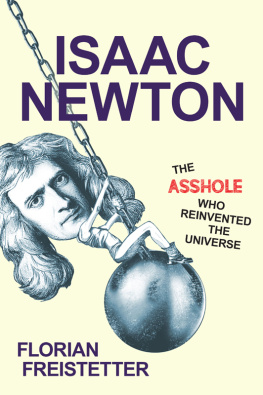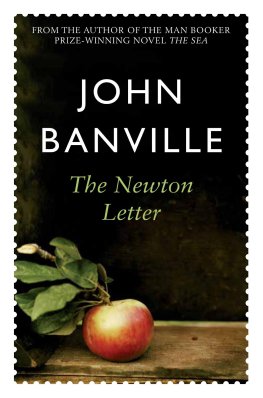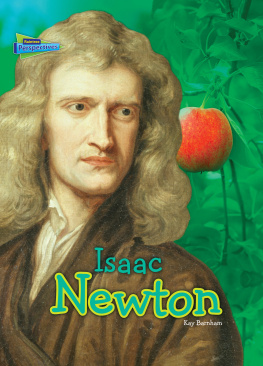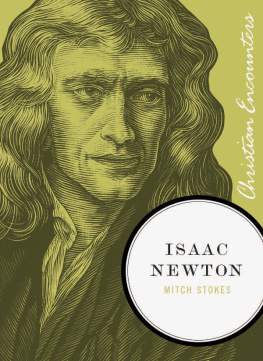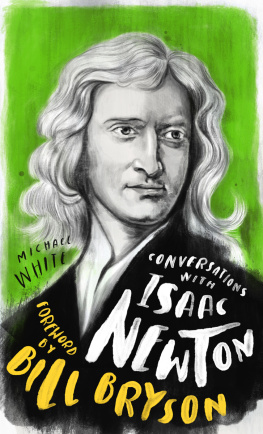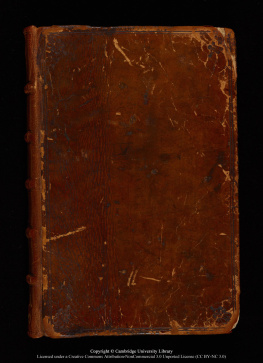
I'm not sure whether Isaac Newton would thank me for writing a book about him that, while it does place great emphasis on his life and work, places equal emphasis on his undesirable character traits and even calls him an asshole. He most probably wouldn'tI, however, am only too pleased to express my thanks to him, whom I consider to be one of the greatest geniuses of all time and whose work forms the basis of my own work and career as an astronomer. Without Newton, I couldn't have become an astronomer and couldn't have written this book, so thanks a lot, Isaac Newton!
I'd also like to thank my editor, Christian Koth, who was of great assistance in ensuring that I didn't get lost in the vast quantity of material and stories about Isaac Newton, and without whom this book would not have ended up as it is.
I am also grateful to all of my colleagues at the Science Busters; over the course of many discussions and appearances, they have helped me to understand how to present complex specialist topics as entertainingly as possible.
Thanks to Thomas Posch from the Vienna University Observatory for the wonderful guided tour of the museum there, for answering my questions on the history of astronomy, and giving me the chance to browse through books that Kepler once browsed through.
And finally, I'd like to thank the test readers, who reliably informed me when things were not clear enough: many thanks to Dagmar Fuchs, Nina Wallerstorfer, Andr Lampe, Florian Rodler, Matthias Kittel, and Franziska Hufsky.
Thank you!

Unless specified otherwise, the dates refer to the Gregorian calendar in use today.
December 1642: Birth of Isaac Newton (according to the Julian calendar used at the time).
January 1643: Birth of Isaac Newton (according to the Gregorian calendar used today).
January 1646: Newton's mother Hannah marries Barnabas Smith (Newton's biological father having died three months before the birth of his son).
1655: Newton attends school in Grantham and boards with the local apothecary.
1659: At his mother's request, Newton has to return to Woolsthorpe.
1661: Newton begins his studies at Trinity College, Cambridge.
1665: Newton completes his studies in January; in August, the outbreak of the plague forces him to return to Woolsthorpe, where he remains for eighteen months. Here, he investigates optics, mathematics, and gravity, and lays the foundations for his later, revolutionary works.
1667: Newton is elected a fellow of Trinity College.
1668: Newton visits London for the first time.
February 1669: Newton describes his reflecting telescope in a letter to the Royal Society.
October 1669: Newton becomes Professor of Mathematics at Cambridge.
January 1672: Newton is elected a member of the Royal Society.
February 1672: Newton sends his findings about the nature of light to the Royal Society. His row with Robert Hooke begins.
February 1675: Newton attends a meeting of the Royal Society for the first time.
1679: Newton and Hooke begin correspondence about the motion of celestial bodies.
1680: Newton observes a comet.
1681: Newton begins correspondence with John Flamsteed about the motion of comets.
January 1684: Halley, Hooke, and Wren meet in a coffee house and discuss a law to describe the motion of the celestial bodies.
August 1684: Edmond Halley visits Newton in Cambridge and prompts the latter's work on gravity. Newton begins work on the Principia.
April 1686: Newton presents the first volume of the Principia to the Royal Society.
July 1687: The Principia is published.
July 1693: Newton suffers a nervous breakdown.
September 1694: Newton visits John Flamsteed in Greenwich. The row about the star catalogue begins.
1696: Newton is offered a post at the Royal Mint.
February 1700: Newton becomes Master of the Mint.
November 1701: Newton is elected to Parliament.
December 1701: Newton resigns from his post as Professor of Mathematics at Cambridge.
November 1703: Newton becomes President of the Royal Society.
1704: Newton publishes Opticks, with his work on calculus first appearing there in an appendix.
1705: The precedence row with Leibniz begins.
April 1705: Newton is knighted by Queen Anne.
March 1712: The Royal Society sets up a committee to clear up the precedence row between Newton and Leibniz.
1713: Newton publishes the second edition of the Principia.
1726: Newton publishes the third edition of the Principia.
March 1727: Isaac Newton dies.

Few other scientists have been the subject of as many books as Isaac Newton, and there is also a plethora of works about his contemporaries and the development of science in the seventeenth century. There is no scope here for a complete overview of all the literature concerning Newton, but I would like to mention a few important works that I used myself when researching this book.
The definitive biography is still Never at Rest by Richard Westfall. If the nine hundredodd pages are a bit too much, I can also recommend the 2003 book Isaac Newton by James Gleick as an introduction to Newton's life. Gleick's book is short and readable, yet still includes all the most important aspects of Newton's life and offers an extensive list of source material. Newton's Gift: How Sir Isaac Newton Unlocked the System of the World by David Berlinski is also short, though written in slightly more mathematical and scientific language, and describes Newton's main achievements in science. Another biography, which above all deals in detail with Newton's alchemistic work, is Isaac Newton: The Last Sorcerer by Michael White. The Foundations of Newton's Alchemy by Betty Jo Teeter Dobbs deals exclusively with Newton's alchemy and the history of alchemy itself, but its complexity means that it can only really be recommended for readers interested in this particular subject.
Those who really wish to immerse themselves in Newton's science can of course read his actual publications and letters. At http://www.newtonproject.sussex.ac.uk, the original and translated versions of Newton's works have been made public. However, Newton's magnum opushis Principiais presented in a much more comprehensible form in Colin Pask's Magnificent Principia. Don't let a bit of mathematics and corresponding diagrams and formulae put you offyou'll be rewarded with a generally understandable explanation of the most important aspects of Newton's work.
The fascinating story of Newton's estate is told by Sarah Dry in her book The Newton Papers: The Strange and True Odyssey of Isaac Newton's Manuscripts. The row between Isaac Newton and John Flamsteed (which is of course also described in all the above-mentioned biographies) is vividly recounted in the short book Newton's Tyranny by David and Stephen Clark. The story of a supposed dispute between Isaac Newton and the physicist Stephen Gray, which is also told in this book, seems to be the product of the authors imagination, however, and does not come from the available sources. Thomas Levenson writes about Newton's career in finance and his pursuit of counterfeiters in his highly readable book Newton and the Counterfeiter, which also contains an extensive biography of William Chaloner. The short book
Next page
